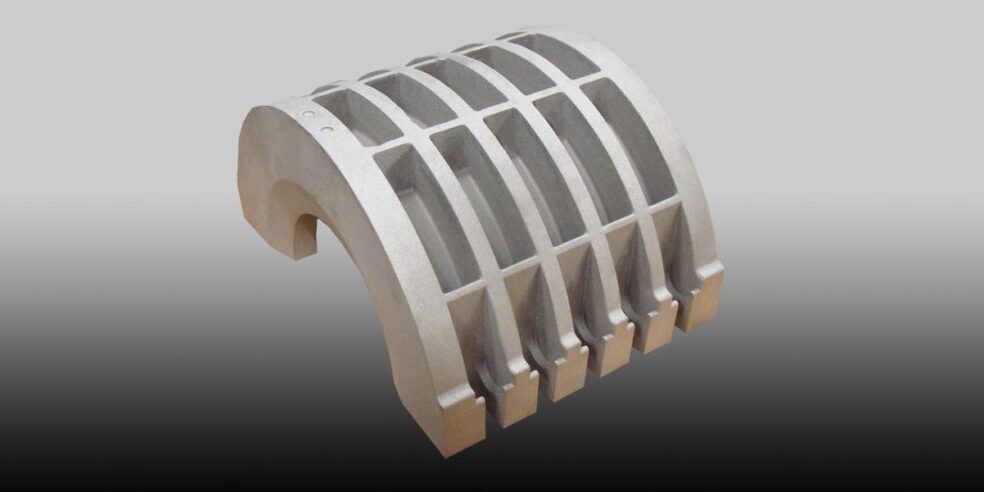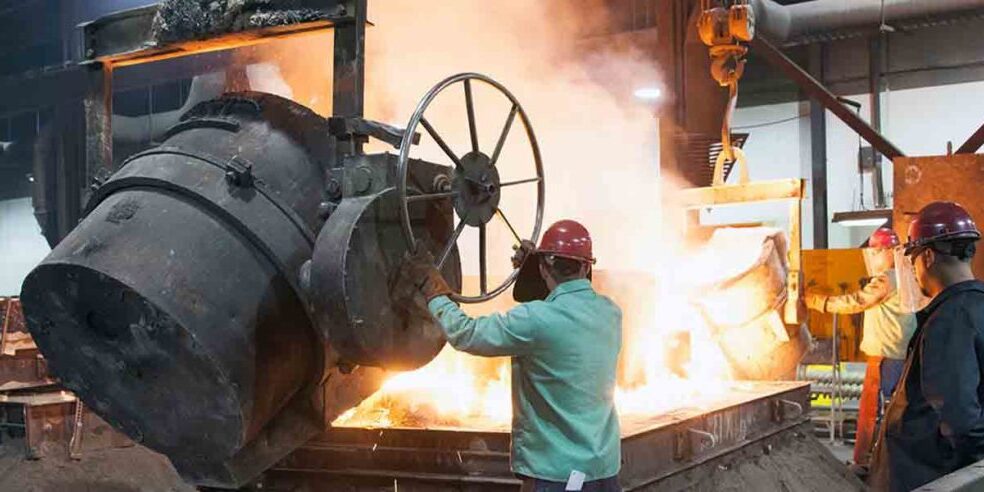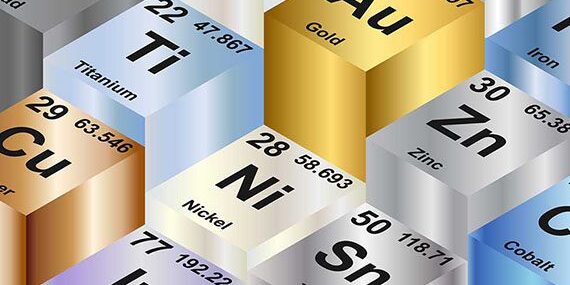Blog Metallurgy And Its Role In The Metal Casting Process
The world of foundry processes is complex. It’s a realm where science and artistry intersect, where raw materials are transformed into intricate components.
At the heart of these processes, you’ll find the metallurgist.
Metallurgists play a pivotal role in foundry operations. They are the custodians of metal casting, the architects of alloy development, and the guardians of quality control.
Their work involves understanding the properties of metals and harnessing this knowledge to create products that meet specific requirements.
In this article, we dive into the world of metallurgist foundry processes. We’ll discuss:
- What is a Metallurgist? We’ll cover how metallurgists ensure material selection and quality control in foundry processes.
- Foundry Technologies. Learn about key casting methods like centrifugal casting, sand casting, and investment casting, along with industry advancements.
- Sustainability and Innovation. How can metallurgists promote eco-friendly practices and leverage new technologies for future growth?
Join us as we journey into the heart of the foundry, where metallurgists shape the future of industries, one casting at a time.
The Role Of Metallurgy In Foundry Processes
Metallurgy is the backbone of foundry processes. It involves the study and application of the properties of metals and alloys.
In foundries, metallurgists ensure that the right materials are used. Their expertise helps in understanding the specific behaviors of metals under different conditions.
By analyzing phase diagrams and thermal properties, metallurgists guide the selection and development of metals. These insights are crucial for producing castings that meet stringent quality and performance standards.
Ultimately, metallurgy makes it possible for foundries to create diverse products. These range from simple components to complex, high-performance parts.
A Metallurgist’s Responsibilities In Foundries
Metallurgists play an essential role in foundries. They oversee the entire casting process, ensuring precise adherence to specifications. This involves selecting appropriate materials and developing alloys with desired properties.
Furthermore, metallurgists address casting defects such as porosity and shrinkage. They implement quality control measures to ensure consistent and high-quality outputs. By collaborating with other engineers, they continuously optimize processes for improved efficiency and reduced costs.
Their responsibilities also include ensuring compliance with safety protocols and environmental regulations. Metallurgists are instrumental in integrating sustainable practices within foundry operations. Through ongoing research and development, they contribute to innovation and advancement in foundry technology.
Foundry Technology: An Overview
Foundry technology encompasses diverse processes and techniques aimed at producing metal castings. It involves converting raw metals into precise shapes for various industrial applications. Each process has its unique strengths, making it suitable for specific types of production requirements.
Technological advancements continue to shape the foundry industry. Innovations such as 3D printing and advanced simulation have significantly enhanced traditional methods. These developments improve efficiency, reduce waste, and enhance product quality, keeping the foundry sector at the forefront of manufacturing.
Centrifugal Casting
Centrifugal casting excels at creating high-integrity, cylindrical metal components. Molten metal is poured into a rotating die, and centrifugal forces distribute the material evenly, eliminating gas porosity and enhancing density. This method is particularly well-suited for producing pipes, tubes, and rings with superior mechanical properties, finding applications in industries like aerospace, defense, oil and gas, and turbine engine.
Sand Casting
Sand casting is one of the oldest and most versatile methods in foundry technology. It utilizes sand molds to create intricate designs. The process is cost-effective and ideal for large-scale production, accommodating a wide range of metal types and sizes.
Investment Casting
Investment casting involves creating a ceramic mold around a wax pattern. Once the wax is removed, molten metal is poured into the mold. It excels at producing complex geometries and high-precision components.
Alloy Development And Material Selection
Alloy development is crucial in tailoring materials for specific applications. Metallurgists focus on modifying metal compositions to enhance properties such as strength, ductility, and corrosion resistance. By understanding these properties, they can engineer solutions that meet performance requirements.
Material selection involves evaluating the suitability of alloys for different industrial uses. Metallurgists must consider factors such as mechanical requirements, environmental conditions, and cost-effectiveness. The right choice of materials can significantly influence the longevity and performance of the final product, underscoring the metallurgist’s pivotal role in foundry success.
Understanding Phase Diagrams And Melting Techniques
Phase diagrams are essential for predicting how metals behave under different conditions. They help metallurgists understand the temperature and composition relationships in alloy systems. Mastery of these diagrams allows them to anticipate phase transformations and design effective casting processes.
Melting techniques are fundamental in controlling the quality of metal casts. They require precision in temperature regulation to prevent defects. Metallurgists use advanced melting methods to achieve desired microstructures, ensuring the integrity and performance of the final cast product.
Addressing Common Casting Defects
Casting defects can significantly impact the quality of metal products. Issues like porosity and shrinkage arise due to improper cooling and gas entrapment. Metallurgists employ various techniques to identify and rectify these defects during the manufacturing process.
Addressing defects requires a combination of prevention and correction. Metallurgists implement precise control over cooling rates and use advanced inspection methods. These strategies ensure castings meet quality standards and reduce material waste, leading to more efficient operations in foundries.
Quality Control And Non-Destructive Testing
In foundry operations, quality control is crucial for ensuring the integrity of castings. Metallurgists play a key role in establishing rigorous testing protocols that guarantee product reliability.
Non-destructive testing (NDT) methods allow for the inspection of castings without altering their structure. Techniques like ultrasonic testing and radiography help detect internal flaws. By employing NDT, metallurgists can swiftly identify issues, ensuring that only defect-free castings reach the final stages of production. This process enhances overall efficiency and product quality.
Process Optimization and Continuous Improvement
Process optimization in foundries revolves around enhancing efficiency and reducing waste. Metallurgists collaborate with engineers to streamline operations, ensuring processes are cost-effective and high performing.
Continuous improvement focuses on adopting new techniques and technologies. They lead initiatives to integrate advancements like automation and data analytics. This approach not only boosts productivity but also aligns with evolving industry demands. Through constant refinement, foundries can remain competitive and responsive to market changes.
Environmental Considerations And Sustainability In Foundry Operations
Sustainability has become central in modern foundry operations. Metallurgists play a vital role in reducing environmental impact. They develop eco-friendly alloys and recyclable materials to minimize waste. This shift is crucial as industries face increasing pressures to adopt green practices.
Energy efficiency is another focus area. Metallurgists work to optimize melting and casting processes, reducing energy consumption. They implement practices like recycling scrap metal to further conserve resources. By addressing these environmental factors, foundry operations become more sustainable, contributing positively to global efforts in reducing carbon footprints and promoting a circular economy.
The Future Of Foundry Technology And Metallurgy
The foundry industry is evolving with technological advancements. Automation and smart technologies are transforming manufacturing processes. Metallurgists are key in integrating these innovations into daily operations. This shift aims to enhance precision and reduce errors.
3D printing is another game-changer. It revolutionizes mold creation and prototyping, offering new possibilities in design and efficiency. As the industry transitions, metallurgists embrace these tools to stay competitive. By focusing on innovation, the future of foundry technology promises increased sustainability, efficiency, and adaptability.
Conclusion: The Impact of Metallurgists on Foundry Processes
Metallurgists are pivotal in refining foundry processes. Their expertise in alloy development and defect prevention enhances quality and efficiency. By driving innovations and sustainable practices, metallurgists shape the future of the industry. Their contributions ensure adaptability and competitiveness in evolving market landscapes. Their role is undeniably essential.
At MetalTek, our dedicated team of experienced metallurgists and engineers work collaboratively to deliver exceptional foundry solutions. With a robust team size and deep expertise in metallurgical processes, we are committed to integrating innovative technologies and sustainable practices in every project.
If you’re looking for a partner to enhance your metal casting processes and optimize the quality of your products, contact MetalTek today. Let us bring our integrated approach to your foundry operations, ensuring efficiency, sustainability, and superior performance. Get in touch with our experts to learn how we can drive your success in the foundry industry!



